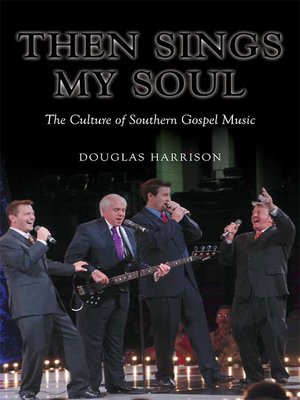Then Sings My Soul
ebook ∣ The Culture of Southern Gospel Music · Music in American Life
By Douglas Harrison

Sign up to save your library
With an OverDrive account, you can save your favorite libraries for at-a-glance information about availability. Find out more about OverDrive accounts.
Find this title in Libby, the library reading app by OverDrive.



Search for a digital library with this title
Title found at these libraries:
| Library Name | Distance |
|---|---|
| Loading... |
In this ambitious book on southern gospel music, Douglas Harrison reexamines the music's historical emergence and its function as a modern cultural phenomenon. Rather than a single rhetoric focusing on the afterlife as compensation for worldly sacrifice, Harrison presents southern gospel as a network of interconnected messages that evangelical Christians use to make individual sense of both Protestant theological doctrines and their own lived experiences. Harrison explores how listeners and consumers of southern gospel integrate its lyrics and music into their own religious experience, building up individual—and potentially subversive—meanings beneath a surface of evangelical consensus. Reassessing the contributions of such figures as Aldine Kieffer, James D. Vaughan, and Bill and Gloria Gaither, Then Sings My Soul traces an alternative history of southern gospel in the twentieth century, one that emphasizes the music's interaction with broader shifts in American life beyond the narrow confines of southern gospel's borders. His discussion includes the "gay-gospel paradox"—the experience of non-heterosexuals in gospel music—as a cipher for fundamentalism's conflict with the postmodern world. |
Cover
Title Page
Copyright
Contents
Acknowledgments
Introduction: A Native Informant's Report from the Field
1. Glory Bumps; or, The Psychodynamics of the Southern Gospel Experience
2. Nostalgia, Modernity, and the Reconstruction Roots of Southern Gospel
3. The Rise of "Southern" Gospel Music and the Compensations of History
4. The Gaitherization of Contemporary Southern Gospel
5. Southern Gospel in the Key of Queer
Epilogue: The Soul's Best Song
Appendix A: Songs Referenced
Appendix B: Methods and Preliminary Findings of a Survey of Attitudes and Beliefs about Southern Gospel Music
Notes
Index
Back Cover
| "Harrison's work suggests that autobiographical approaches to popular culture have the potential to resonate far beyond a solitary author. It suggests that there might be a whole lot more to the music than has previously been considered."—Register of the Kentucky Historical Society
"A significant contribution to understanding Southern white gospel music and evangelical religious practice. Harrison treats seriously a music that has long been dismissed and neglected as simplistic and is thus vastly understudied."—Jeff Todd Titon, author of Powerhouse for God: Speech, Chant, and Song in an Appalachian Baptist Church
"A compelling and eloquent first book-length critical analysis of the music and social context of modern Southern gospel. Truly one couldn't conjure up a scholar better equipped to write on this topic, which Harrison addresses with notable authority and ambition."—David W. Stowe, author of No Sympathy for the Devil: Christian Pop Music and the Transformation of American Evangelicalism
"Resists facile caricature and simplistic interpretation of a musical tradition which, although it has demonstrated global appeal, remains linked to rural white Southern fundamentalism. . . . Harrison's book complicates our sense of who 'we' are and where that 'beautiful shore' may be. He makes us believe that even within fundamentalist evangelicalism, these borders are not nearly so fixed as we might have supposed."—Religion Dispatches
"A thoughtful and provocative monograph that addresses lacunae in ethnographic research on southern evangelical culture, religion, and music by delineating the important historical roles played by composer/publisher Aldine S. Kieffer (and his partner Ephraim Ruebush), and by songwriter/performer Bill Gaither (and his wife Gloria)."—Journal...
"A significant contribution to understanding Southern white gospel music and evangelical religious practice. Harrison treats seriously a music that has long been dismissed and neglected as simplistic and is thus vastly understudied."—Jeff Todd Titon, author of Powerhouse for God: Speech, Chant, and Song in an Appalachian Baptist Church
"A compelling and eloquent first book-length critical analysis of the music and social context of modern Southern gospel. Truly one couldn't conjure up a scholar better equipped to write on this topic, which Harrison addresses with notable authority and ambition."—David W. Stowe, author of No Sympathy for the Devil: Christian Pop Music and the Transformation of American Evangelicalism
"Resists facile caricature and simplistic interpretation of a musical tradition which, although it has demonstrated global appeal, remains linked to rural white Southern fundamentalism. . . . Harrison's book complicates our sense of who 'we' are and where that 'beautiful shore' may be. He makes us believe that even within fundamentalist evangelicalism, these borders are not nearly so fixed as we might have supposed."—Religion Dispatches
"A thoughtful and provocative monograph that addresses lacunae in ethnographic research on southern evangelical culture, religion, and music by delineating the important historical roles played by composer/publisher Aldine S. Kieffer (and his partner Ephraim Ruebush), and by songwriter/performer Bill Gaither (and his wife Gloria)."—Journal...







